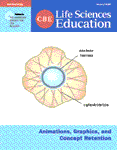Supplemental Instruction in Introductory Biology I: Enhancing the Performance and Retention of Underrepresented Minority Students
Abstract
Supplemental instruction classes have been shown in many studies to enhance performance in the supported courses and even to improve graduation rates. Generally, there has been little evidence of a differential impact on students from different ethnic/racial backgrounds. At San Francisco State University, however, supplemental instruction in the Introductory Biology I class is associated with even more dramatic gains among students from underrepresented minority populations than the gains found among their peers. These gains do not seem to be the product of better students availing themselves of supplemental instruction or other outside factors. The Introductory Biology I class consists of a team-taught lecture component, taught in a large lecture classroom, and a laboratory component where students participate in smaller lab sections. Students are expected to master an understanding of basic concepts, content, and vocabulary in biology as well as gain laboratory investigation skills and experience applying scientific methodology. In this context, supplemental instruction classes are cooperative learning environments where students participate in learning activities that complement the course material, focusing on student misconceptions and difficulties, construction of a scaffolded knowledge base, applications involving problem solving, and articulation of constructs with peers.



